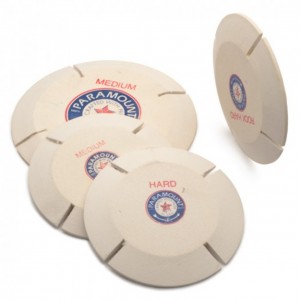The wool felt wheel industry is undergoing a significant transformation with a growing focus on sustainable sourcing and production methods. In an era where environmental consciousness is at an all – time high, both manufacturers and consumers are demanding more eco – friendly options, and wool felt wheels are no exception.
Sustainable sourcing of wool is at the core of this transformation. Instead of relying on conventional wool production, which may involve intensive farming practices and the use of harmful chemicals, many manufacturers are now partnering with organic and ethical wool producers. These producers follow strict animal welfare standards and use natural farming methods that minimize the environmental impact. By sourcing wool from such suppliers, wool felt wheel manufacturers can ensure that their products are not only of high quality but also have a reduced carbon footprint.
In addition to sustainable sourcing, the production process of wool felt wheels is also evolving. Traditional manufacturing techniques often involve a large amount of water and energy consumption. Newer, more sustainable production methods aim to reduce these resources. For example, some companies have adopted innovative felting processes that use less water by recycling and reusing it within the production line. Energy – efficient machinery is also being employed, which not only cuts down on electricity usage but also reduces greenhouse gas emissions.
The push for sustainability is also reflected in the packaging of wool felt wheels. Many manufacturers are now using biodegradable or recyclable materials for packaging, eliminating the use of plastic and other non – eco – friendly substances. This small but significant change helps to further reduce the environmental impact of the product throughout its life cycle.
Consumers are responding positively to these sustainable initiatives. A recent market survey showed that 65% of consumers are more likely to purchase wool felt wheels from brands that prioritize sustainability. This growing consumer preference has led to an increase in the demand for eco – friendly wool felt wheels, especially in the DIY and hobbyist markets. DIY enthusiasts, in particular, are eager to use products that align with their environmental values while still achieving excellent results in their projects.
The impact of sustainable sourcing and production in the wool felt wheel industry is not limited to the environment. It also has social and economic benefits. By supporting ethical wool producers, the industry is contributing to the livelihoods of farmers who adhere to sustainable practices. Moreover, as more companies adopt sustainable methods, there is a growing demand for skilled workers who can operate and manage these new production processes, creating new job opportunities.
Looking ahead, the trend towards sustainable wool felt wheels is likely to continue. As environmental regulations become stricter and consumer awareness increases, manufacturers will need to continuously innovate and improve their sustainable practices to stay competitive in the market. The future of the wool felt wheel industry lies in its ability to balance performance, quality, and sustainability, creating products that meet the needs of both the market and the planet.

Post time: Jun-05-2025
